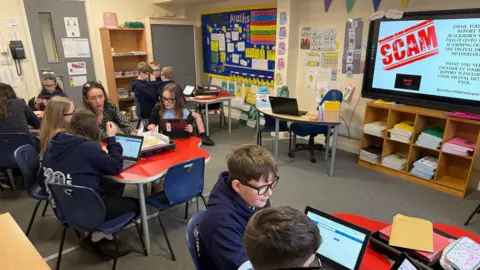Almost half of children in Wales scammed online
 BBC
BBCMore than 40% of children in Wales have been scammed online, according to new research.
The findings by the UK Safer Internet Centre have been released to mark Safer Internet Day.
Staff at Griffithstown Primary School, in Pontypool, Torfaen, are teaching pupils aged between seven and 11 about recognising scams.
Rebecca Thomas, a teacher leading the class, said it is important to "prepare" the children at a young age so they are less susceptible to a scam in the future.
Ms Thomas said children are "more likely" to be the victim of an online scam as we "enter a more digital age".
"If it is too good to be true then it probably is. Manipulative language, the use of emotive language, or saying that they are in trouble on the scam," she said.
She said the aim of the class is not to make "pupils panic", but to ensure that they remain calm when faced with a scammer.
"Never reveal any personal information. If they are unsure they can talk to a trusted adult in school, and outside of school," Ms Thomas added.

Ms Thomas said Artificial Intelligence (AI) is something that teachers now have to be "mindful" about in a school setting.
"Just making sure that pupils are aware of what is real and what is fake so they know how to stay safe with this emerging technology," she said.
Nearly half of teenagers feel that online scams are getting more convincing, and around a third of young people worry that the use of new technology, such as AI, will make scams much harder to identify, the research showed.
Young people are most commonly becoming victims of fake giveaways often tricking people into sharing personal information and online shopping scams.
 Getty Images
Getty ImagesOliver, 10, is a pupil at the school and has been given an exercise focusing on an offer about a computer game.
"It says click here for unlimited Roblox tokens and then says 10,000 tokens. So that's misinformation and normally when something sounds too good to be true, it is too good to be true," he said.
Lyra, also 10, said you should "always think" about what you are doing when you are online
More than 80% of children aged between eight and 17 spot a scam at least one a month, according to the research.
It also found scams can impact victims emotionally with many people, including children, blaming themselves.

Headteacher Nick Blackburn said it is "important" for his pupils to know what a scam looks like.
"There are so many traps out there that they could fall into. It's important we show them all the opportunities that ensure that they are safe," he said.
There are calls for more support to tackle online crime and help young people stay safe online.
Director of the UK Safer Internet Centre Will Gardner said "education is key".
The centre is now focusing on supporting intergenerational learning, for children, parents and carers.
"For too long, young people have been overlooked, yet our research clearly demonstrates how much of an impact online scams can have on them," he said.
